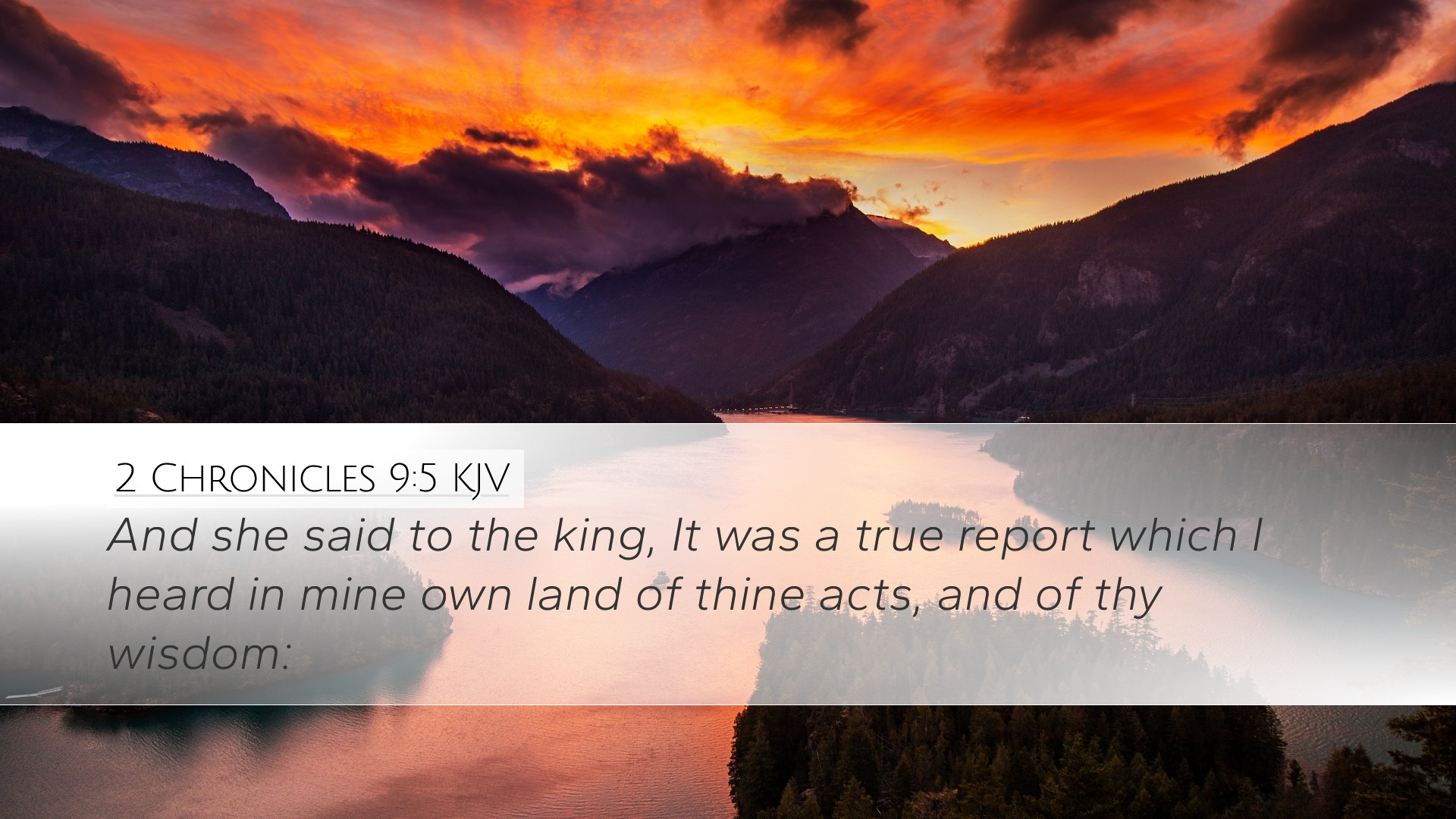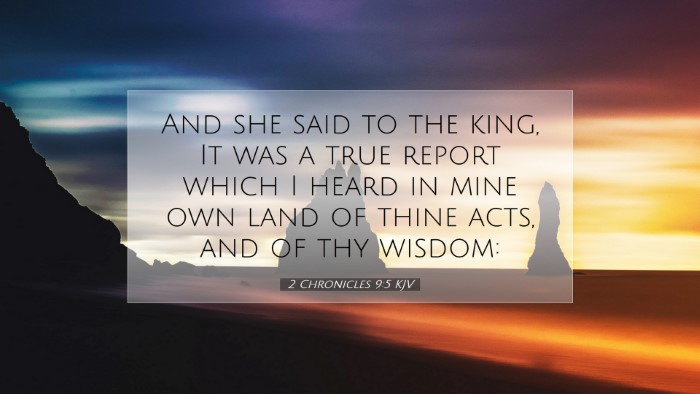Commentary on 2 Chronicles 9:5
2 Chronicles 9:5 states:
"And she said to the king, 'The report was true which I heard in my own land of your words and of your wisdom.'
Overview
This passage comes from the account of the visit of the Queen of Sheba to King Solomon, emphasizing the international recognition of Solomon's wisdom and wealth. It serves to illustrate not only the fame of Solomon but also the fulfillment of God's promise to make him renowned among nations.
Context
The passage falls within the sections of the books of Chronicles that detail Solomon's reign. Specifically, it highlights how Solomon’s reputation had reached distant lands and provoked interest and admiration. This story illustrates the universal impact of God’s favor on His chosen leader.
Interpretative Insights
Matthew Henry's Commentary:
- Henry emphasizes the significance of the queen’s visit as a demonstration of the far-reaching influence of Solomon's wisdom.
- He notes that the Queen of Sheba's acknowledgment of Solomon's wisdom reveals the divine origin of that wisdom.
- Henry points out that her words reflect a common reaction when one encounters true wisdom, which prompts inquiry and admiration.
- The visit is also seen as emblematic of the desire for spiritual knowledge and understanding, represented by the Queen coming from afar to seek Solomon.
Albert Barnes' Notes:
- Barnes highlights the significance of the queen’s statement in verse 5, where she validates what she had heard about Solomon.
- He suggests that her testimony reinforces the notion that reports of Solomon's wisdom and riches were not exaggerated.
- Barnes also discusses the cultural perspective of the time, wherein figures of authority often sought learning from other realms, portraying Solomon as a revered sage.
- The verse indicates the fulfillment of the expectations that surrounded Solomon based on previous prophecies and expectations set forth during David's reign.
Adam Clarke’s Commentary:
- Clarke provides an analysis of the linguistic elements in the queen's speech, attributing her respect for Solomon to his divine wisdom.
- He interprets the phrase “the report was true” as a recognition of the authenticity of Solomon's acclaim, suggesting that wisdom and wealth had been witnessed firsthand.
- Clarke also notes the importance of inquiry and the pursuit of wisdom characterized by the queen's visit, illustrating a paradigm for future generations on the value of seeking understanding.
- The encounter serves as a historical lesson regarding the spread of wisdom across borders, calling attention to the theological assertion that God’s truth is recognized universally.
Thematic Considerations
Several key themes arise from this verse:
- Wisdom: The centrality of divine wisdom is a theme that recurs throughout the scriptures, with Solomon epitomizing this characteristic. The acknowledgment of that wisdom by a foreign sovereign underscores its authority and reach.
- Recognition: The Queen's recognition of Solomon emphasizes the importance of being known for one's deeds. It prompts reflection on how one's actions can resonate across distances, impacting others’ perceptions far away.
- Seekers of Wisdom: The need to seek wisdom and understanding, as modeled by the Queen’s journey to Solomon, presents a lesson for all readers—indicating that true wisdom beckons a response.
- God’s Sovereignty: The narrative showcases God's providential hand in placing Solomon in a position of power that elicits recognition both for Israel and for God's glory on a global scale.
Conclusion
2 Chronicles 9:5 serves as a window into the significant role of divine wisdom in shaping the historic narrative of Israel and its leaders. The Queen of Sheba’s affirmation highlights not only the reality of Solomon's capabilities but also makes a larger theological claim about the nature of wisdom as a gift from God. For pastors, students, theologians, and Bible scholars, this verse encapsulates the essence of inquiry into divine matters and the appreciation of wisdom as a treasure sought across all nations.


